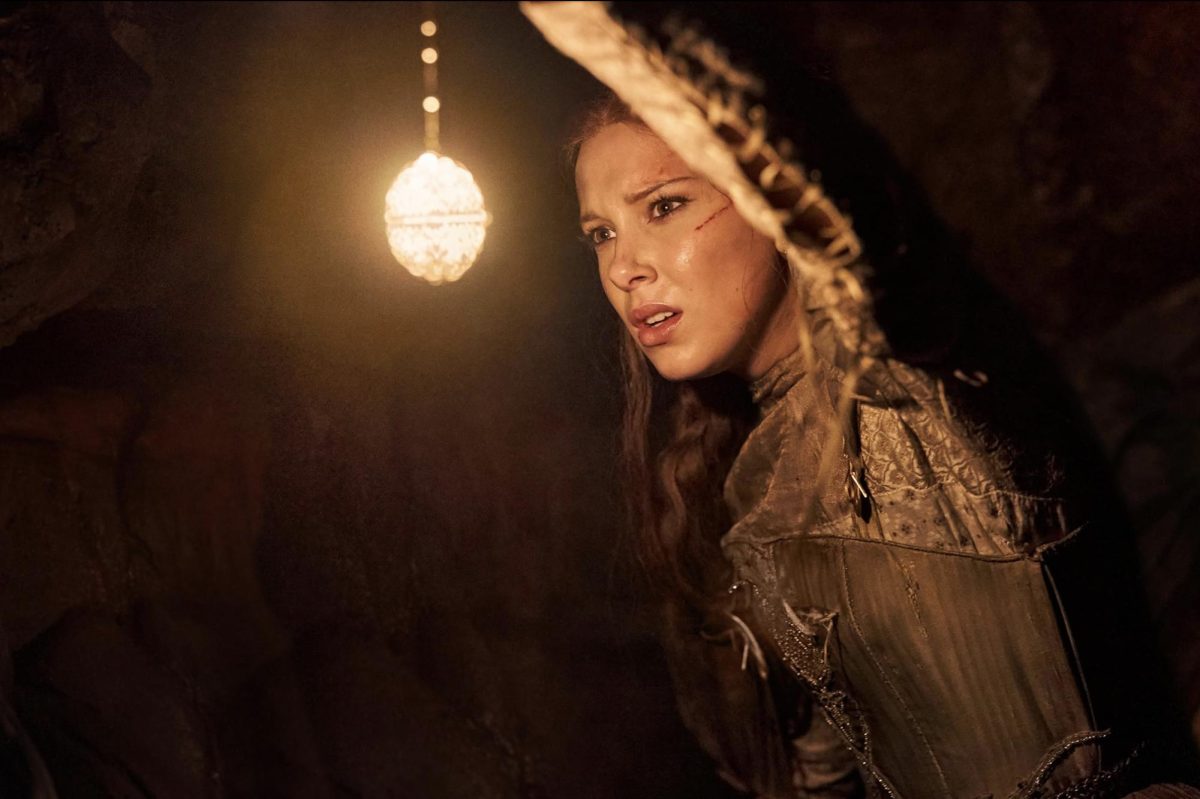As I hit play on my dimly lit Netflix screen, I was prepared for another disappointing feminist film full of cliches and half-assed effort. Instead, within the first five minutes of “Damsel,” I found myself utterly bewitched by its plot and visuals. Released on March 8, the film has swiftly earned a place among my favorite female-led narratives of all time.
The story centers around Princess Elodie, played by Millie Bobby Brown, as she embarks on a journey to the kingdom of Aurea with her family to finalize her betrothal to Prince Henry, played by Nick Robinson. The marriage to the affluent prince is meant to rescue Elodie’s people from famine. However, much to Elodie’s astonishment, her prospective in-laws sacrifice her to a dragon by throwing her into a cave. The rest of the tale chronicles her transformation into a heroine who not only saves herself but her sister as well.
Although the plot incorporates numerous cliches such as an evil queen and epic dragon battles, they are executed with finesse. Notably, “Damsel” diverges from conventional tropes by introducing a compassionate and supportive stepmother, a refreshing departure from the expected villainous archetype.
One of Elodie’s distinctive traits is her departure from the stereotypical rebellious heroine who refuses to marry and just wants to read books. She prioritizes her people’s welfare and happily agrees to a marriage, possibly even developing feelings for Prince Henry, only to be betrayed by him and cast into a cave. This storyline diverges from the typically encountered female warrior tales, which is simply refreshing.
One aspect of the film that enchanted me is its aesthetic. The ships and castles evoked the grandeur of “Game of Thrones,” while the magical elements and lush green valleys transported me to the realm of “Narnia.” The seamless transition between Elodie’s time in the cave and the royal family’s life in the castle, juxtaposing warmth and darkness, achieved nothing short of perfection.
Let’s delve into the most captivating aspect of the film’s storyline — the dragon, or should I say, dragoness (spoilers ahead). First and foremost, I must commend the writers for endowing the dragoness with depth and dialogue rather than reducing her to mere screams every few seconds and calling that a film. Voiced by the Shohreh Aghdashloo, the dragoness is unveiled as a grieving mother who has lost three of her dragon daughters at the hands of the royal family. In retaliation, she demands a sacrifice of three royal females every year.
The decision by the writers to portray the ostensibly villainous dragoness as a maternal figure nursing deep wounds was a stroke of brilliance and a much-needed plot twist. It challenges our conventional empathy for male villains with tragic backstories, granting the dragoness the same depth and justification for her anger.
Furthermore, the film offers a compelling “who’s the real villain” moment, ultimately exposing the royal family’s culpability. Although more screen time for the nefarious queen, who upholds the sacrificial tradition, would have been appreciated, the portrayal of a vulnerable prince who bends to his mother’s will is a refreshing departure from the typical knight-in-shining-armor trope.
The movie’s blend of captivating scenery and a compelling plot initially promised a delightful experience. However, my enjoyment was tainted when I stumbled upon the vehement criticism it garnered, particularly directed towards the lead actress, Brown. It seems many reviewers dismissed the film as predictable and cliche, a judgment seemingly based solely on the trailer rather than watching the film.
It’s disheartening to observe that instead of being afforded a fair chance and acknowledged as a commendable female-led narrative, “Damsel” faced unwarranted backlash simply for featuring a female protagonist. One critic even disparaged it by saying, “Seems like Netflix will say yes to anything with Millie Bobby Brown in it.” It’s evident that certain critics harbor animosity towards Brown, leading to unjustified hostility towards the entire film.
Another critic said, “I always like it when characters living in a feudal quasi medieval society have the worldview and aspirations of 21st century gender studies graduates from Southern California.” I found this observation particularly intriguing because it bears no relevance to the film itself. Elodie willingly accepts marriage and embraces the necessity to sacrifice her modern aspirations. So, what precisely is amiss with her character?
Seems like some just favor the tired trope of the “strong woman” character, typically penned by male writers, characterized by quick wit, tight attire and an underlying longing for male approval, over a genuine portrayal of a heroine with depth and a profound love for her family.
While “Damsel” may not claim the title of the greatest movie ever made, it undeniably stands as a captivating and enjoyable film. It’s a story perfect for a cozy Netflix movie night, whether shared with family or friends. I can’t help but reiterate that it was hated for giving women a chance to be seen as something more.



